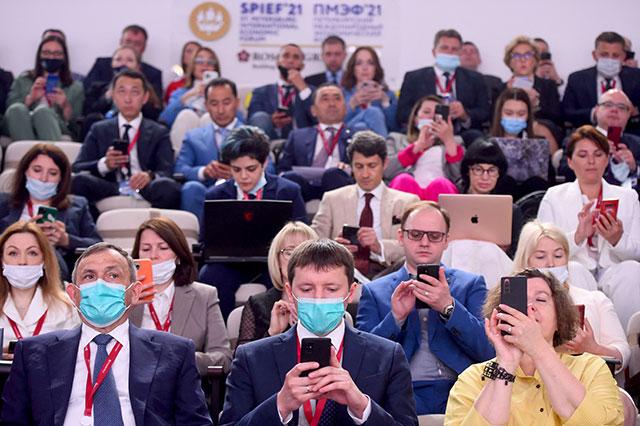- Mix
- Sun-2021-06-06 | 01:50 pm

Nayrouz News Agency :
A flagship economic forum has returned to Saint Petersburg, with Russia aiming to signal it has moved beyond the coronavirus pandemic and is open for business.
The Saint Petersburg International Economic Forum (SPIEF), often dubbed the Russian Davos, officially started on Thursday and is the country's main showcase for investors, attracting political and business leaders from around the world.
It has been hosted every year since 1997 -- cancelled only in 2020 due to the pandemic -- in the hometown of President Vladimir Putin, who is expected to speak at the forum in person on Friday.
"The forum is very important for the image of the city, the restoration of the economy's growth and the revival of tourism," Saint Petersburg governor Alexander Beglov told the RIA Novosti news agency.
The scale of the forum is smaller than previous years, with the number of participants capped at 5,000. In comparison, the 2019 SPIEF was attended by over 19,000 people from 145 countries, according to organisers.
Leaders of China, France and India have previously attended the forum.
This time Putin will be joined via videolink by Austrian Chancellor Sebastian Kurz and Sheikh Tamim bin Hamad Al-Thani, the emir of Qatar, which has sent one of the biggest delegations this year.
The reduced attendance also comes after a turbulent year for Russian diplomacy, as relations with the West -- which have been deteriorating since the annexation of Crimea in 2014 -- reached a new low following the poisoning and imprisonment of Kremlin critic Alexei Navalny.
It is also a challenging time for independent media and opposition groups in Russia that have faced increasing pressure in recent years.
Independent business new outlet VTimes announced on Thursday it would shut down after being branded a "foreign agent", a designation that requires it to disclose its funding and label its publications with a tag.
Handshakes, no masks
Russian officials say that "bad politics should not be allowed to interfere with good business", said Chris Weafer, analyst and founder of Macro-Advisory consultancy firm.
According to Weafer, one of the messages at this year's SPIEF is that "Russia has turned a corner and has learned from the last seven years" characterised by low oil prices and sanctions.
But in 2020, the inflow of foreign direct investment to Russia slumped to the level of the mid 1990s, the Central Bank said in January, after years of steadily decreasing against the backdrop of sanctions.
The forum comes almost a year after Russia lifted its strict lockdown that was imposed last spring when the coronavirus swept across the country.
Since late summer most virus restrictions have been lifted with authorities opting to protect the economy and pin hopes on Russia's Sputnik V jab that was registered in August.
The country still continues to record an average of 9,000 new infections every day.
To ensure virus safety at the forum, all participants this year are required to test negative for the coronavirus before they enter the site. Inside, masks are required at all times.
Julius Bakazarov, a 19-year-old forum volunteer, said participants "never ignore requests" to wear masks or observe other measures.
But the reality is different, with few people wearing face coverings, handshakes among participants and large crowds gathering at the forum venues, an AFP journalist reported.
'Observe the rules'
Saint Petersburg, Russia's second largest city, has struggled to contain the spread of the virus, especially after a boom in domestic tourism made the former capital a popular travel destination.
Just days after the forum, the city will also host several matches of the postponed Euro 2020 football tournament that will bring together thousands of fans, both from Russia and abroad.
SPIEF volunteer Yekaterina Bolkhovskaya, who lives in Saint Petersburg, said holding an event such as the economic forum can only have a "positive effect".
"This will remind people that if they want to participate in big events then they need to... observe the rules of personal hygiene and safety," the 19-year-old said.
-
 Will Trump end up like Kennedy?2026-02-03
Will Trump end up like Kennedy?2026-02-03








